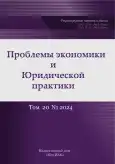Criteria Determining the Moments of the Beginning and End of the State of Necessary Defense
- Authors: Boev D.V.1
-
Affiliations:
- Belgorod State National Research University
- Issue: Vol 20, No 1 (2024)
- Pages: 108-111
- Section: Criminal Law
- URL: https://journal-vniispk.ru/2541-8025/article/view/284301
- EDN: https://elibrary.ru/YONWWU
- ID: 284301
Cite item
Abstract
The relevance of the study of the issues of legislative establishment and law enforcement of necessary defense is due to the fact that the state, ensuring the implementation of the constitutional right of citizens to protect their rights and freedoms by all legal means, providing such an opportunity, requires its citizens to fulfill the necessary conditions, failure to comply with which will be considered a crime. Failure to comply with the legitimate requirements of the state to comply with the limits of necessary defense entails bringing the defending person to criminal responsibility, and therefore, the person who defended his rights and interests becomes the person who committed the crime. The subjectivity of the definition of «exceeding the limits of necessary defense», the problems that appear in judicial practice when recognizing the behavior of the defender as lawful, the cancellation of judicial acts on the legality of the actions of the defender—all these points require finding solutions to the issues raised, solving the problem of criminal law assessment of the legality of the necessary defense. Despite the centuries-old history of the institute of necessary defense and the vast experience of its application, law enforcement officers have great difficulties in practice when assessing the legality of the behavior of the defender.
Full Text
##article.viewOnOriginalSite##About the authors
Dmitry V. Boev
Belgorod State National Research University
Author for correspondence.
Email: Aval31@mail.ru
ORCID iD: 0000-0002-3109-3970
SPIN-code: 7799-1126
Assistant of the Department of Criminal Law and Procedure, applicant
Russian Federation, BelgorodReferences
- Avdeeva E. V. Necessary defense: topical issues of legislative regulation and law enforcement // A Russian judge. —2019. —No. 1. —pp. 16–17.
- Garbatovich D. A. Establishing the boundaries of criminalization of acts through regulation and law enforcement of norms on circumstances excluding criminality of acts // Russian Justice. 2020. No. 4. pp. 21–22.
- Dmitrenko A.P., Sarnitsky S.N. Objective and subjective criteria determining the moments of the beginning and end of the state of necessary defense, when protecting against ongoing and ongoing socially dangerous encroachments // Bulletin of the Moscow University of the Ministry of Internal Affairs of Russia. 2019;(7):112-7.
- Kazarina M.I., Barkanov I.A. On criteria for distinguishing necessary defense from exceeding the limits of necessary defense // Glagol of justice. 2020. No. 2 (24). pp. 11–14.
- Bulletin of the Volgograd Academy of the Ministry of Internal Affairs of Russia. —2019. —№ 1 (48). —Pp. 57–64.
- Nikulenko A.V., Smirnov M.A. Necessary defense and exceeding its limits: possibilities of legislative improvement // Bulletin of the St. Petersburg University of the Ministry of Internal Affairs of Russia. 2020. No. 3 (87). pp. 111–117.
- Malkin V.R. Causing harm in conditions of necessary defense. Criminal law doctrine and problems of qualification // Bulletin of the St. Petersburg University of the Ministry of Internal Affairs of Russia No. 2 (90) 2021. pp .91–98.
- Martynenko N.E. Necessary defense: problems of its legislative establishment and practical application. //Proceedings of the Academy of Management of the Ministry of Internal Affairs of Russia. 2022. No. 3 (63) pp. 100–108.
- Tarakanov I. A. Necessary defense: the specifics of the perception by the defending person of the nature and danger of encroachment / Topical issues of improving Russian legislation and the activities of the penal enforcement system: collection of scientific papers / ed. Tkachenko E. S. —Vladimir : Publishing House of Vladimir. Jurid. inst. FSIN, 2019. —pp. 358–366.
- Tarakanov I. A., Sergeeva M. M. Features of legislative consolidation of the right to necessary defense in the Criminal Code of the Russian Federation // Penitentiary law: legal theory and law enforcement practice. —2019. —№ 1 (19). —Pp. 105–109.
- Shchepelkov V.F. Report on the monitoring of judicial practice in the application in 2019 of Part 1 of Article 108 of the Criminal Code of the Russian Federation (Murder committed in excess of the limits of necessary defense) in cases of domestic violence https://spbu.ru/sites/default/files/shchepelkov_otchet_po_monitoringu_primeneniya_ch._1_st._108_uk_rf.pdf.
Supplementary files








